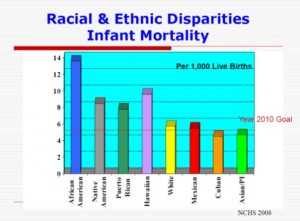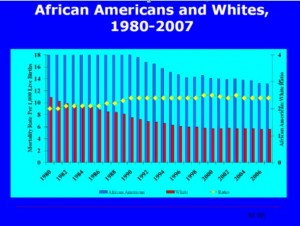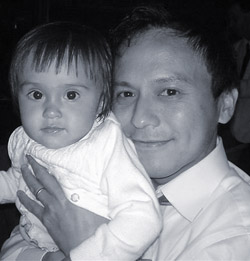Preconception and Women's Healthcare: An Interview with Dr. Michael Lu (Part Five)
By: Walker Karraa, PhD | 0 Comments
[Editor's note: This is the fifth and final part of an interview series between Science & Sensibility's Walker Karraa, and OBGYN Dr. Michael Lu. To read the interview from the beginning, go here. For a list of resources pertaining to this interview series, go here: resources and bibliography_dr lu interview series.]
Racial Gaps, Future Research
Walker Karraa: Your work regarding the racial gap in maternal and infant mortality in the United States is profoundly important. How might childbirth educators begin to address that, or become part of the conversation and part of the solution? It's a big question.
Dr. Lu: It is a big question. It's a hard question because right now my understanding is that Medicaid still doesn't pay for childbirth education, right?
Walker Karraa: Correct.

Dr. Lu: Yeah, you know that in California, about half of all births are paid for by Medicaid and for African-American women I think it's more like 60% or 65%. So two-thirds of all African American women are on Medicaid, which means they have no access to childbirth education unless they pay out of pocket. So this is an access issue. Low income women have access to WIC, but WIC is so overwhelmed that they can't do very much in terms of nutritional, or childbirth education counseling.
In terms of mental health - it's hard enough for my private patients with super prenatal insurance to see a good mental health professional in a timely manner, [so] think about [what happens with] the low income women with limited access.
This might potentially worsen rather than improve with Health Care Reform. Why don't we talk about that? What's the impact of the Medicaid Reform going to be on infant mortality and on the racial gap of infant and maternal mortality? There's very little discussion about that. I'm all for Health Care Reform, but it's really just health insurance reform. Instead, let's think through what are the components of care that really optimize women's health, and make sure there is equal access to those components for African American women.
Shouldn't there be universal coverage for childbirth education? Of course if it's only known as 'childbirth education,' there might not be as much support for it. But if that education could be broadened, which I really think it should, there may be greater support for universal coverage.
Walker Karraa: Can you share what your current research involves?
Dr. Lu: The big research I'm doing right now is with the National Children's Study. It [involves following] 100,000 kids from before birth up to 21 years of age. We're going to their homes to collect air, water and sewer samples. We'll be at the birth of every child to collect placenta [samples], cord blood, etc. Including 4,000 right here in Los Angeles [from] six different neighborhoods. We've got kids living right next to the Port of Long Beach, or the oil refineries, or next to interstate interchange - what are all the environmental influences on their health? There is still so much that we don't know about the causes and prevention of childhood diseases like autism, diabetes, asthma, etc. - can we do a better job in terms of preventing them? I think the National Children's Study has the potential to give us a lot more information that would help inform in programs and better practices.
In terms of racial disparities, (through the NIH, Community Child Health Network) we have been creating these Best Baby Zones around the country. It's a place-based-systems approach to addressing the problem of high infant mortality in this country. In 12 communities from Harlem to West Oakland, we would do whatever it takes to really improve child and family health - with the goal of closing the gap of infant mortality in ten years. Whatever it takes means not only improving health care quality, but working on improving educational development, economic development, community development. It's basically transforming an entire community. So I'm pretty excited about it, but again, [it is] very hard work and very transformative work.
And then lastly I was just appointed by Kathleen Sibelius, Secretary of Health and Human Services, to chair the Secretary's committee on infant mortality. The last chair was working under a different administration, so I think the environment may be more favorable for us to make some of our recommendations and have a greater impact. I'm trying to think through what some of those recommendations might be, for example - how do we redesign Healthy Start so [that it has] greater impact? With all of the discussion around health care reform, around Medicaid and so forth - a lot [of that currently] focuses on the elderly. So little national discussion has been about how all of this is going to impact maternal mortality and infant mortality. And we know it's going to have a big impact - so what recommendations can we, as a committee, make to the secretary to make sure that we put safe guards in place?
Walker would like to thank Dr. Lu and his assistant Louise Ino for their time and support, and Kimmelin Hull for editorial assistance.
[Editor's note: Science & Sensibility would like to thank Dr. Michael Lu for taking the time to discuss his past, present and future work in obstetrics and preconception care. Thank you, also, to Walker Karraa, for bringing us this fascinating and most informative interview. Indeed, as childbirth educators, we are compelled to consider our current and future professional role in the health of childbearing women and their families - and the ways we might expand our expertise to keep pace with the educational needs of this large segment of our population.]
________________________________________________

Michael C. Lu, MD, MPH is an associate professor of obstetrics & gynecology and public health at UCLA. Dr. Lu received his bachelor's degrees from Stanford University, master's degreefrom UC Berkeley, medical degree from UC San Francisco, and residency training in obstetrics & gynecology from UC Irvine. He is widely recognized for his research, teaching and clinical care. Dr. Lu received the 2004 American Public Health Association Young Professional Award for his research on health disparities. He recently served on the Institute of Medicine Committee (IOM) on Understanding Prematurity, and is currently serving on the IOM Committee to Reexamine IOM Weight Guidelines. He is a member of the Centers for Disease Control and Prevention Select Panel on Preconception Care, and a lead investigator for the National Children's Study in Los Angeles. Dr. Lu teaches obstetrics and gynecology at the David Geffen School of Medicine at UCLA, and maternal and child health at the UCLA School of Public Health. He has received numerous awards for his teaching, including Excellence in Teaching Awards from the Association of Professors of Gynecology and Obstetrics. Dr. Lu sees patients at the faculty group practice in obstetrics and gynecology at UCLA Medical Center, and has been voted one of the Best Doctors in America since 2005. Dr. Lu was recently appointed by Secretary of Health and Human Services Kathleen Sebelius to chair the Secretary's Advisory Committee on Infant Mortality.
Dr. Lu Presentation: http://dhsmedia.wi.gov/main/Viewer/?peid=8650dbb4-6b3b-4770-ab78-9fb3ebc0427b
Published: July 22, 2011
Tags
PregnancyMaternal Infant CareInfant MortalityHealthcare ReformWalker KarraaMaternal mortalityDr. Michael LuPreconception CareDoes Medicaid Pay For Childbirth Education?Racial Disparities In Women's Healthcare